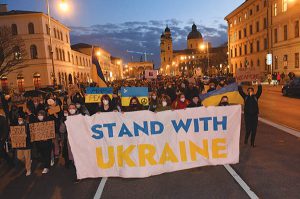If the “no limits†partnership announced between China and Russia on the eve of the Winter Olympics amounted to a blueprint for a new world order, it’s already looking a little frayed around the edges. Russia’s invasion of Ukraine has left Beijing struggling to straddle a line between its cardinal foreign-policy principle of respect for sovereignty and territorial integrity, and support for an ally. That discomfort has set off a flurry of speculation over what China knew about President Vladimir Putin’s intentions.
Whatever the conclusion, it doesn’t look flattering for Chinese President Xi Jinping. Russia’s aggression has led to international isolation, galvanised a united front of opposition across Europe, the US and beyond, and sent ripples through
financial markets. Even a pro-Russian autocratic leader such as Hungary’s Viktor Orban has agreed to back sanctions against Moscow. Was Beijing aware of Putin’s plans and went ahead with its pact with Russia regardless, hitching itself to a country that was about to turn into a pariah? The alternative explanation is that Putin kept his hand hidden. If that’s the case, it hardly helps to burnish Xi’s reputation as a master strategist steering China’s path back to greatness, in a year when he will seek a precedent breaking third leadership term.
The balance of the evidence points to China being unaware of what was about to unfold. There has been the awkward dissonance of its public response, reasserting respect for state sovereignty while repeatedly refusing to criticise Russia or refer to the Ukraine operation as an invasion. China abstained on a United Nations resolution condemning the Russian action, in what some interpreted as showing a lack of support for its geopolitical partner. Barely three
weeks after Xi affirmed the two countries’ “deepening strategic coordination of mutual support and standing shoulder to shoulder for international fairness and justice,†it turns out there are limits to the friendship after all.
Chinese policy advisers were clearly taken by surprise. Shen Yi, a professor at Fudan University, held a conference call titled “A War That Would Not Be Fought†with brokerage clients prior to the invasion. The US was talking up war to destabilise Europe and benefit American industries, Renmin University’s Jin Canrong, who is also a visiting professor at the University of Michigan’s Gerald Ford School of Public Policy, told China’s state broadcaster. Not “a single Chinese policy wonk bought the idea†that Russia would invade, Yun Sun, a senior fellow and director of the China program at the Washington-based Stimson Center, wrote.
While some diplomatic dissimulation is possible and academics can get things wrong, there are more tangible reasons to believe that Beijing didn’t know an invasion was coming. For one thing, there was the failure to prepare any evacuation plan for Chinese residents in Ukraine and then the embassy’s conflicting messages — telling people to display Chinese flags on their cars before rescinding that advice two days later. It is “unthinkable that Beijing knew but did not bother to prepare,†as the Stimson Center’s Sun observed.
Beyond this, there is the fact that US officials presented intelligence to their Chinese counterparts showing the troop buildup near Ukraine’s borders and pleaded with them to use their influence to persuade Russia not to invade. Instead, Chinese officials shared the information with Moscow.
That decision hints at a key reason why Beijing miscalculated so badly. The China-Russia rapprochement is driven by a shared mistrust of the US, and a deeply ingrained perception that the existing international order is a vehicle for Washington to exercise dominance over other nations. The two countries’ joint statement explicitly opposed enlargement of Nato (a key bone of contention for Putin in his targeting of Ukraine) and called on the alliance to “respect the sovereignty, security and interests of other countries.†US intentions are, by definition, to be regarded with suspicion; the possibility that the American warnings might be true, and that Putin might be a malign and irrational actor planning to violate the security of another sovereign nation doesn’t appear to have entered into consideration.
The strength of the backlash to the Ukraine invasion should give Beijing pause. The oil, gas and wheat that may flow from its closer relationship with Russia could never compensate for any similar
ostracism from the international system, membership of which has benefited China’s economy mightily. And for all the existing system’s imperfections, would an alternative architecture in which Putin’s Russia is a principal partner provide the order and security that China has sought?
Popular notions that liberal democracy is decadent and in decline might also merit some re-examination. Europe’s democracies have recovered a clarity and unity of purpose that was difficult to imagine before this crisis, and with a speed that China has often held out as being an advantage of its one-party system.
There are some growing signs of ambivalence within China. Foreign Minister Wang Yi has edged closer to criticism of Russia, saying Tuesday that China “deplored†the conflict and is extremely concerned about the harm to civilians. Some commentary sympathetic to Ukraine has been allowed to circulate among the pro-Russian voices on China’s heavily controlled internet, though an open letter by five historians denouncing Moscow’s actions was quickly removed. China won’t repudiate its alliance with Russia, but the inability to anticipate the Ukraine invasion is an unambiguous failure. It deserves to prompt a reassessment on multiple fronts — from the top down.
—Bloomberg
Matthew Brookeris a columnist and editor with Bloomberg Opinion. He previously was a columnist,
editor and bureau chief for Bloomberg News. Before joining Bloomberg, he worked for the South China Morning Post. He is a CFA charterholder
 The Gulf Time Newspaper One of the finest business newspapers in the UAE brought to you by our professional writers and editors.
The Gulf Time Newspaper One of the finest business newspapers in the UAE brought to you by our professional writers and editors.

